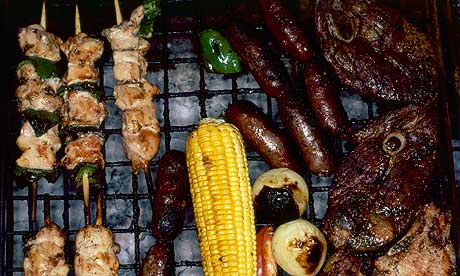
Beer, ice-cream, crisps, Indian takeaways, chips and anything in batter: normally, it's a particular food type that gets blamed for helping the British to pile on the pounds. But now a whole style of cooking and eating has come under fire for encouraging obesity in the UK.
Research shows that Britons consume more than the recommended daily intake of calories in a single barbecue meal, with men often eating more than 3,500 calories and women more than 2,500.
The study, conducted by Boots and the Tony Ferguson Weightloss Programme, found that the average helping includes two sausages, one-and-a-half burgers, two chicken drumsticks, one and a half meat skewers, fish, a baked potato, a green side salad, pasta salad, a desert and – for the sake of healthiness, no doubt – a bowl of fruit salad to round the meal off.
That equates to just under 3,000 calories, 500 calories more than the recommended daily intake for men and 1,000 more than women are permitted.
Gaila Ferguson, co-founder of the Tony Ferguson Weightloss Programme, blames barbecue bingeing on tradition: "When you do a barbecue, you always have to have sausages, burgers, steaks, pasta salad, cous cous salad, potato salad and all the bits on the side. And when you have all those options you feel obliged to try them all, especially if you are a guest."
As the average family will have nine barbecues this summer (weather permitting), she suggests concentrating on one or two flame grilled and side salad options at each meal, and introducing simple measures like taking the skin off chicken to reduce fat content. "Put a chicken breast in some foil with lemon juice and some nice spices and herbs so it steams on top of the barbecue and stays moist, then take the foil off for the last few minutes so it gets the smokey flavour," she says. "Fish is also great. Peppered tuna is quick on the barbecue and it's full of omega 3s and 6s. Even a steak is great so long as you cut the fat off."
But diners should still exercise "portion control", adds Ferguson: one sausage is apparently much better than three. A tofu kebab or mixed green salad with harissa dressing is even better, according to the Tony Ferguson Cook Book. Barbecue diners can also consume twice their daily recommended intake of salt in one meal, according to Consensus Action on Salt & Health.
After surveying 603 shop-bought food products typically eaten at barbecues, it found that a typical meal comprising a hotdog with mustard, a burger with cheese and BBQ sauce, a piece of marinated meat, some coleslaw, potato salad and plain crisps with dips could include 12.11g of salt, more than double the recommended maximum of 6g for an adult.
The organisation points out that some sauces such as ketchup and mustard are even saltier than sea water, and warns that some foods which score well on fat content, such as venison burgers, are higher in salt than their beef counterparts. Burgers tend to be saltier than sausages, while coleslaws with prawns or cheese tend to be higher in salt than the basic varieties.
However, the Boots research indicates that any advice on sensible alfresco eating habits is likely to be ignored: it found that although a third of those questioned (2,000 adults) were aware they eat more food than usual, 41% chose to forget how many calories they were consuming and ate as much as they wanted.

